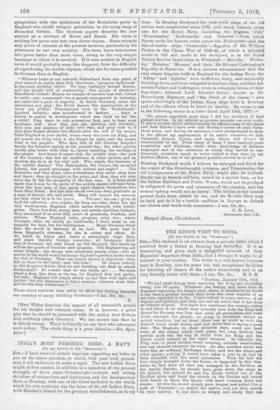THE KING'S VISIT TO INDIA..
[To TRIO EDITOR OP TICS "Erreraroa."J
Sin,—The enclosed is an extract from a private letter which I received from a friend in Bombay last Saturday. It is so interesting, and gives such a delightful account of their Majesties' departure from India, that I thought it might be of interest to your readers. The writer is a well-known business man in Bombay, who for years has had exceptional facilities for knowing all classes of the native community and is on very friendly terms with them.—I am, Sir, &c., E. S. B.
"Bombay, January 11th, I1)12.
"We bad great doings hero receiving the King and yesterday seeing him off again. Whatever the fooling may have been in England regarding the King's visit, there is absolutely no doubt it has been a greater success than even the most hopeful of us out here expected it to be. I have talked to many natives, of all degrees and opinions, and they, one and all, admit that it has done an infinity of good. You know how emotional the average native is, and there is no doubt they honestly love both the King and Queen for tho easy way they cast aside all precautions and went about amongst the people ; no pomp or ceremony, except on special occasions, but on those there was as much as even the native's heart could desire, and you know that is saying a good deal. The Moghuls, in their palmiest days, could not beat some of the scenes which took place, but what fetched the natives most was the way in which both the King and the Queen could unbend at the right moment. In Calcutta the King rode in plain clothes every morning, entirely unattended, and was cheered wherever he went. He also motored about the town like an ordinary Exchange broker, and saw the slums and other places ; a. thing it would have taken a year to do had he been attended with the usual procession. Then his last act here simply brought down the house; it happened in this way. After he had done all that was arranged in the Pavilion on the Apollo Bunder, ho should have gone down the steps to his launch, but instead he and the Queen walked out of the Pavilion alone and faced the crowds on the Bunder and waved their hands to them, the Queen with tears running down her cheeks. At this the crowd simply gave tongue and yelled like a path of "Tommies '—so unlike the native, and yet they nearly all were natives. It was done so simply and nicely that one cannot wonder at the emotional native loving them for it ; in other parts of India they did many other similar acts and all are remembered. I am ignorant of the reasons which led up to the partition of Bengal, but there is no doubt the King's action has made the people of that Province very happy, and, after all, it is only a very minor detail of the interior economy of the British Empire, and I do not think it will Puffer very much, whatever the consequences of the act may be. Then the change of the capital to Delhi, with its historical and sentimental traditions, is a very good move, and probably every one outside Calcutta thinks so ; it is far more central, and has the advantage of being 400 miles nearer Bombay, the mail port. The move may also in time enable the ordinary individual to live in Calcutta, which at present, on account of rents, dee., is impossible with any comfort. The Calcutta landlords feel it most, and the newspapers will also suffer in circulation, so the latter are naturally crying out; but the news- papers outside Calcutta, such as the Pioneer and the Times of India, approve the change."











































 Previous page
Previous page